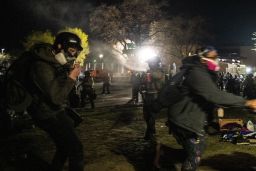Minnesota’s governor expressed regret Saturday after the alleged mistreatment of journalists covering demonstrations in Brooklyn Center by law enforcement, as attorneys representing news organizations released a letter calling out several examples throughout the week – including the arrest of a CNN producer.
At least 100 demonstrators have been arrested during protests over the death of Daunte Wright, who was shot and killed on April 11 by a Brooklyn Center police officer during a traffic stop. Some journalists at the demonstrations, including those with credentials, were also detained and photographed by police before later being released.
During an hour-long phone conference with law enforcement officials and an attorney representing media outlets – including CNN – Minnesota Gov. Tim Walz said he was embarrassed about the treatment of reporters after police ordered the crowd to disperse, according to a participant in the meeting.
“A free press is foundational to our democracy. Reporters worked tirelessly during this tumultuous year to keep Minnesotans informed. I convened a meeting today with media and law enforcement to determine a better path forward to protect the journalists covering civil unrest,” the governor said on Twitter Saturday.
Attorney Leita Walker, writing on behalf of more than two dozen journalism and media outlets, sent a letter to Gov. Walz and public safety officials after the meeting. The letter alleges multiple instances of journalists being harassed, assaulted, or arrested by law enforcement officers while covering protests in Minnesota.
CNN producer Carolyn Sung was grabbed by her backpack and thrown to the ground by state troopers while trying to comply with a dispersal order, the letter said.
Her hands were zip-tied behind her back, she did not resist and repeatedly identified herself as a journalist working for CNN while showing her credentials, according to the letter. The male security agent hired to work with her was also detained but then released after he showed his credentials.
A trooper yelled at Sung, “Do you speak English?” despite her identifying herself several times as a journalist and telling the troopers that the zip-ties on her wrists were too tight. Sung was transported to Hennepin County Jail in a prisoner-transport bus where she was processed, the letter said.
“She was patted down and searched by a female officer who put her hands down Sung’s pants and in her bra, fingerprinted, electronically body-scanned, and ordered to strip and put on an orange uniform before attorneys working on her behalf were able to locate her and secure her release, a process that took more than two hours,” the letter said.

In another instance, several media members, including one from the New York Times, were assaulted by police officers, according to the letter. The officers surrounded their car, banging on windows and doors with wooden sticks before dragging the driver out and arresting them. Officers allegedly hit the New York Times journalist repeatedly and tried to break his camera, the letter said.
The letter includes a photo of an unidentified law enforcement officer spraying chemical agents on journalists, clearly identifiable by their equipment and clothing.
In a press release after Saturday’s meeting, the Minnesota State Patrol acknowledged that, in accordance with a federal judge’s order, a dispersal order does not apply to members of the media covering the protest.
“MSP is prohibited from seizing equipment from or ordering someone to stop recording or observing who we know or have reason to know is a member of the media,” the statement says.
The State Patrol also says it is instructing troopers not to threaten to arrest members of the media unless they are suspected of committing a crime.
CNN’s Travis Caldwell contributed to this report.


